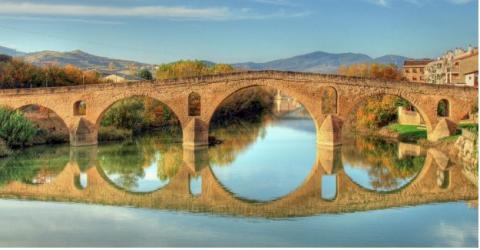New Documentary Highlights the Spiritual Journey of the Camino de Santiago

A 500-mile journey through Spain, the Camino de Santiago is an ancient and world renowned pilgrimage path. The destination is the city of Santiago de Compostela, where the bones of St. James are supposedly buried. Hundreds of thousands of people make the trip each year in search of something.
Walking the Camino is a short documentary that follows six particular travelers—all from different countries and all with different intentions—as they cross the Camino.
Historically, pilgrimages were made on the basis of spirituality and faith—people would start these trips seek forgiveness for their sins and gain admission into heaven (during the Middle Ages when indulgences were still a practice). Because of the length of the Camino, sometimes upper-class citizens would pay poorer people to take the pilgrimage for them, and thus gain their entrance to heaven via substitution. The Camino was also used as a form of punishment for criminals instead of jail.
The ‘cast’ of Walking the Camino’ is a group of six individuals who are looking for ‘something.’ There is Annie, an American who is here for spiritual reasons; Tomas from Portugal who is looking for a physical challenge; two Canadian friends, Jack and Wayne, who are walking to honor Wayne’s deceased wife; Misa from Denmark and Sam from Brazil who are both trying to get in touch with themselves; and Tatiana, who travels with her son and brother to deepen her relationship with God.

Walking the Camino was inspired by director/producer Lydia B. Smith’s finished Camino pilgrimage in 2008. In 2009, Smith and crew went back to the traditional starting point of St. Jean Pied de port, where they eventually met the consistent ‘cast.’ Clocking in at 84 minutes, the documentary’s pace is rather slow, probably an intentional move to reflect the length of the journey, which is roughly six weeks. Because the crew is following along with the pilgrims, the documentary brilliantly captures both the hardships and the genuine reflective moments of each traveler. All the pilgrims struggle in different ways—Tatiana with her brother and son, Tomas with his physical injuries—but they all reach the end of the Camino, transformed for the better by their experiences.
The documentary features interviews with the travelers as well as historians, priests, volunteers and locals who live and work on the road. The common threads between these interviews are the mentions of spirituality, of deep meaningful changes and a growing sense of self and peace. The messages of the film center on reflection, self-awareness and humanity, which is echoed throughout the interview with the cast. We see it when Annie says she is humbled by a fellow traveler’s kindness, or when Sam starts to find clarity during her walk. Walking the Camino presents the idea that the Camino is a metaphor—our lives on this Earth are a long journey or road, and with self-awareness it’ll be easier to figure out where we are headed. Every person’s path is different and personal, and they must go at their own pace.
Author Bio:
Gabriella Tutino is a contributing writer at Highbrow Magazine.




























































































































































































































































































































